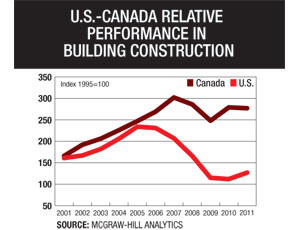The Canadian economy managed to weather the Great Recession in rather good form compared to the U.S. economy. In 2009, Canada’s real GDP dropped 2.5%, compared to a 2.6% decline in the U.S. GDP. However, total employment only fell by 1.6% in Canada compared to a 4.2% drop in the U.S.

As the recovery took hold in late 2009 and early 2010, Canada managed to add back almost two-thirds of the jobs lost during the recession. As a result, the Canadian housing market was able to remain fairly solid.
After falling 13% in 2009, permits will climb 12% in 2010 to $69 billion Canadian dollars. The growth is attributed to mainly acceleration in the residential sector; growth in non-residential permits will remain more subdued, according to McGraw-Hill Construction Research & Analytics. Residential permits will grow 20% in 2010, but as interest rates rise into 2011, the housing market will cool and construction will trail off. Permit values will remain below their 2007 peak over the next several years.
Non-residential permits will grow 2% in 2010 on the back of a 31% increase in the industrial sector. Commercial permits, by contrast, will suffer their third consecutive year of decline as office and warehouse permit intentions continue to be delayed. Growth will not return to the commercial sector until 2012, according to the MHC Research & Analytics forecast.
Institutional permits will decline by 2% in 2010. The only institutional sector to see growth will be education, which will reverse in 2011 as permits show steady gains. Non-residential permits will be flat in 2011 as modest growth in the industrial and institutional sectors is offset by a decline in commercial permits.

Post a comment to this article
Report Abusive Comment